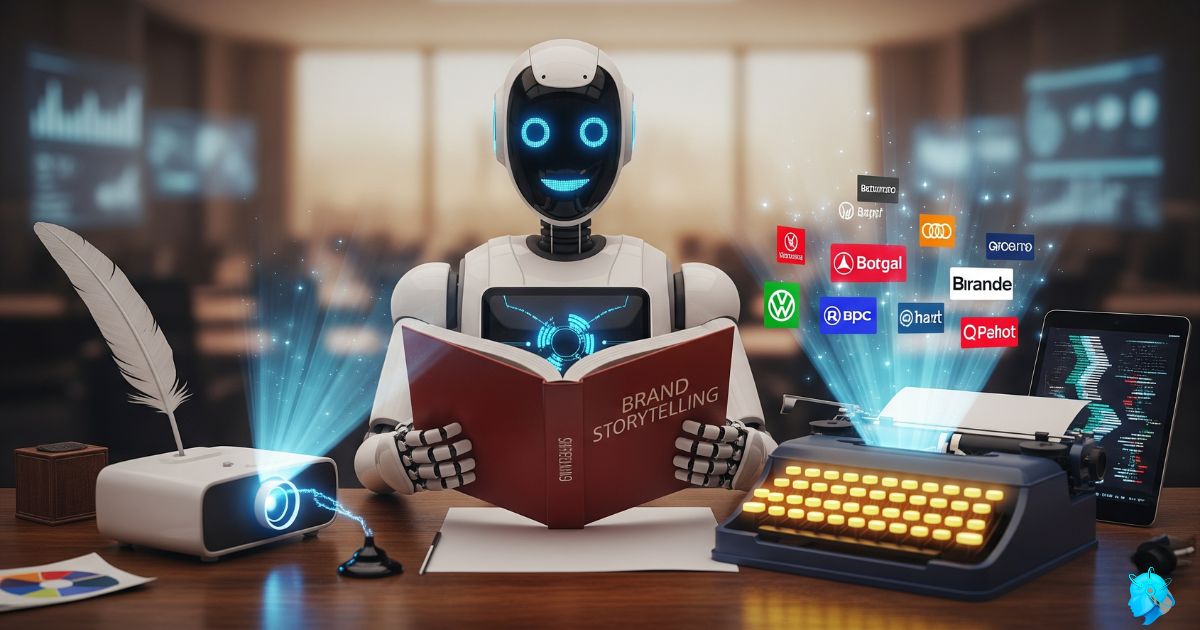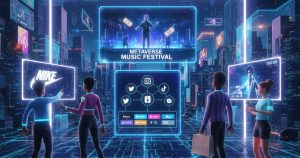AI Brand Storytelling: How Smart Tech Creates Stories That Connect

AI in Brand Storytelling has evolved from a trendy marketing term into a core business strategy. Today, brands that tell powerful stories often see stronger customer loyalty, higher brand awareness, and faster revenue growth. But building meaningful stories at scale has always been difficult—until the rise of AI technology.
AI brand storytelling is changing the way companies create and share narratives. Instead of replacing human creativity, AI supports it. Smart tools study customer data, social media behavior, content performance, and audience preferences to discover what truly connects with people. With this insight, marketers can produce personalized storytelling, stronger brand messages, and data-driven content strategies—faster than ever before.
The result is powerful brand stories that feel authentic, emotional, and personal. Businesses can tell the right story to the right audience at the right time, all with the help of machine learning, content automation, and AI-powered marketing tools. For brands, this is a new era of storytelling: smarter, scalable, and far more effective than traditional methods.
The Evolution of AI in Brand Storytelling
Traditional brand storytelling depended on intuition, personal experience, and broad assumptions about the audience. Marketers would create one story and hope it connected with everyone. This one-size-fits-all approach often failed to reach diverse customer needs.
AI in brand storytelling has changed everything. Today, machine learning algorithms can study customer data, online behavior, and engagement metrics to understand what different audiences respond to. These smart systems uncover patterns that manual research would never find.
With these insights, brands can build multiple narrative versions for different customer groups. For example, a tech company may share a story focused on innovation for early adopters, and another version focused on trust and reliability for enterprise clients. Both stories reflect the same brand, but speak to different motivations.
AI narrative generation tools also review successful stories across industries. They identify language structures, themes, and emotional triggers that create deep customer connections. This makes it easier for marketers to design stories that feel more relevant, emotional, and impactful—without guesswork.
How AI Transforms Brand Narrative Creation

Data-Driven Story Development
AI-driven content creation begins with comprehensive data analysis. These systems examine customer surveys, social media interactions, purchase histories, and website behavior to identify narrative preferences. The technology recognizes which story themes, characters, and plot structures generate the strongest emotional responses from specific audience segments.
This data-driven approach eliminates guesswork from the storytelling process. Instead of assuming what customers want to hear, brands can craft narratives based on proven engagement patterns.
Personalized Story Variations
One of the most powerful applications of AI for marketers is creating personalized brand stories. AI systems can generate hundreds of story variations from a single core narrative, adjusting tone, focus, and details to match different audience preferences.
A fitness brand might use AI to create personalized versions of its founding story. For busy professionals, the narrative emphasizes time-efficient workouts. For fitness enthusiasts, it highlights advanced training methodologies. Each version maintains brand authenticity while speaking directly to specific customer motivations.
Real-Time Story Optimization
Storytelling with AI enables continuous narrative improvement. These systems monitor how audiences respond to different story elements, tracking metrics like engagement time, sharing rates, and conversion outcomes. Based on this feedback, AI tools automatically adjust future storytelling approaches.
This creates a feedback loop where brand narratives become more effective over time. Stories that initially perform well get refined further, while underperforming elements are identified and improved.
Practical Applications of AI Brand Storytelling
Social Media Narratives
AI tools are transforming social media storytelling. They can create platform-specific story variations with ease. The same core message can be reshaped for LinkedIn’s professional audience, Instagram’s visual content style, or TikTok’s short-form video culture.
These systems understand each platform’s format, language, and engagement needs. They adjust story length, visuals, and tone automatically. For example, a B2B software brand might post a detailed case study on LinkedIn but share a shorter, visual success story on Instagram. This approach boosts relevance and engagement on every channel.
Customer Journey Storytelling
Different moments in the customer journey require different types of narratives. AI brand storytelling helps businesses tailor messages based on where customers are in their buying stage.
People at the awareness stage may receive simple brand origin stories filled with inspiration. Meanwhile, customers in the consideration stage may see deeper storytelling, like case studies, testimonials, and success stories.
This targeted approach makes storytelling more meaningful. It ensures that every customer receives the right content at the right time, increasing trust and conversion.
Email Marketing Personalization
Email campaigns improve dramatically with AI-powered storytelling. AI can analyze customer behavior, purchase history, and preferences to build personalized messages.
Product suggestions and offers appear inside relevant stories, making emails feel less like promotions and more like helpful guidance.
This level of personalization strengthens engagement, improves click-through rates, and helps brands build long-term relationships with subscribers.
Building Emotional Brand Connection Through AI
Understanding Emotional Triggers
AI systems excel at identifying emotional triggers that drive customer behavior. By analyzing language patterns, response rates, and engagement metrics, these tools understand which emotions lead to desired actions for different audience segments.
Some customers respond to stories of overcoming challenges, while others connect with narratives about innovation or community building. AI helps brands identify and leverage these emotional preferences systematically.
Scaling Authentic Storytelling
Authenticity remains crucial in AI-generated content. The most effective AI brand storytelling tools maintain brand voice consistency while adapting narratives for different audiences. They learn from existing brand content to understand tone, values, and messaging principles.
This ensures that personalized stories still feel genuinely connected to the brand’s core identity and mission.
Measuring Narrative Impact
AI tools provide detailed analytics on storytelling effectiveness. They track which narrative elements drive engagement, conversion, and customer retention. This data helps brands understand not just what stories work, but why they work.
These insights inform future storytelling strategies and help brands refine their narrative approach based on proven results.
Best Practices for AI-Enhanced Brand Storytelling

Maintain Human Oversight
AI-driven storytelling can analyze huge amounts of customer data and generate content fast. But without human direction, narratives can lose emotion and meaning. Human storytellers understand brand voice, culture, humor, tone, and sensitivity—things AI cannot fully replace.
That is why the best results come from combining AI content creation with human creativity. Marketers, writers, and creative teams should guide AI tools, review their output, and refine the final narratives. This partnership helps brands produce stories that feel authentic, emotional, and aligned with brand values.
For example, AI may identify the best keywords, themes, and structures for audience engagement, but a human storyteller shapes the emotional arc and messaging. When teams act as creative supervisors, AI becomes a tool that improves digital storytelling—not something that replaces it.
Focus on Value-Driven Narratives
Modern audiences want stories that solve problems, inspire, or teach—not just promotional content. Brands should use AI storytelling tools to understand what their audience cares about. AI can identify trending interests, emotional triggers, and pain points across different segments.
Value-driven stories can include:
-
Customer success stories that show real results
-
Brand transparency storytelling that builds trust
-
Educational content marketing that teaches new insights
-
Community storytelling that highlights social impact
When storytelling focuses on value instead of selling, engagement increases. People spend more time with the brand, share content naturally, and develop stronger emotional connections.
Test and Iterate Continuously
AI makes continuous testing easier than ever. Brands can test different versions of brand narratives, story structures, and emotional angles. AI then measures what performs best, helping marketers refine their strategy over time.
This process turns storytelling into a data-driven marketing approach rather than guesswork. Brands learn exactly what resonates—from tone and word choice to narrative length and content personalization style.
Examples include:
-
Inspirational storytelling for emotional impact
-
Case study storytelling for professional audiences
-
Short visual stories for younger social media users
-
Detailed B2B content storytelling for business buyers
By testing and iterating, brands stay ahead of changing customer behavior, market trends, and expectations. It ensures stories remain effective, relevant, and engaging.
The Future of Smart Brand Narratives
AI brand storytelling technology is evolving at a fast pace, and the future looks even more promising. Upcoming advancements will bring deeper personalization capabilities, stronger emotional intelligence, and smoother integration across all customer touchpoints. This means brands will be able to deliver stories that feel more meaningful, relevant, and emotionally rich than ever before.
Companies that adopt AI-powered marketing tools early will gain a strong competitive edge. They will build higher customer engagement, boost brand loyalty, and create deeper emotional connections with their audiences. These brands will also operate more efficiently, using data-driven storytelling instead of relying only on traditional methods.
However, technology alone is not enough. The future of AI in brand storytelling depends on clear goals, strong human creativity, and consistent brand authenticity. AI can guide decisions, but great stories still require real understanding of people—their needs, dreams, and motivations.
As AI content creation becomes more accessible, the most successful brands will be those that use these tools to produce better stories, not just more stories. They will mix machine intelligence with human imagination to build narratives that truly resonate and deliver measurable business results.
This is the next chapter of marketing: smart storytelling, powered by AI, shaped by human insight, and focused on delivering real value to the audience.
FAQs
1. What is AI brand storytelling?
AI brand storytelling is the use of artificial intelligence to create, personalize, and optimize brand narratives. It combines machine learning analysis with human creativity to develop stories that emotionally connect with specific audiences at scale.
2. How does AI improve traditional storytelling methods?
Traditional storytelling relies on intuition and broad assumptions. AI enhances this by using customer data, behavioral insights, and engagement metrics to shape targeted narratives. This ensures stories resonate more deeply and drive better results across diverse customer groups.
3. Can AI-generated stories still feel authentic and human?
Yes. AI tools learn from a brand’s existing tone, messaging, and voice to maintain authenticity. When combined with human oversight, AI-generated narratives sound natural, emotional, and aligned with brand identity—not robotic.
4. What are the practical uses of AI in brand storytelling?
AI can help marketers create personalized email campaigns, platform-specific social media stories, customer journey narratives, and real-time optimized content. It adapts stories for different audience segments and platforms with minimal effort.
5. Will AI replace human storytellers in marketing?
No. AI supports and amplifies human creativity but doesn’t replace it. Humans provide emotional intelligence, cultural awareness, and brand intuition, while AI handles data analysis, personalization, and large-scale content production.






